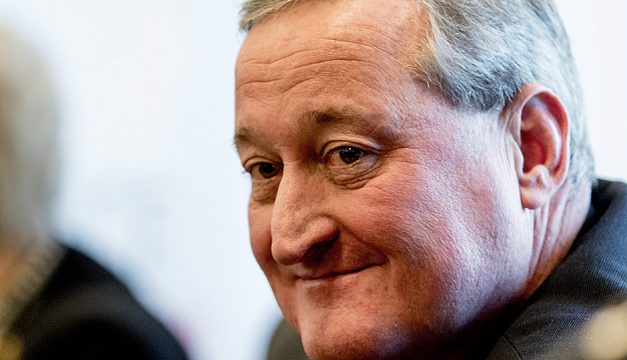5 Takeaways From Kenney’s Report on His First 100 Days in Office

Jim Kenney | Photo by Jeff Fusco
Mayor Jim Kenney isn’t really into the whole idea of reading into a politician’s first 100 days in office.
“Historically, there has been a lot of emphasis placed on the first 100 days of a new administration. Personally, I find that to be a little silly,” Kenney writes in the introduction to a report released today by his administration, titled … er … “First 100 Days: Just Getting Started.”
“The true test of what our city will accomplish is still ahead and, as I’ve said often, the administration will not be able to accomplish anything great alone. So, in the weeks, months and years to come, I look forward to working with City Council, all our many city partners, and most importantly, you to create a fairer future for all Philadelphians.”
The report touches on a lot of topics, and some of the content is pie-in-the-sky — ideas and programs that might work out, if City Council fully supports Kenney’s budget and overall vision, and everything goes according to plan. (Disclaimer: Nothing ever goes according to plan.)
But here are a handful of highlights of actions Kenney has taken during his first three months of running the big office on the second floor of City Hall, according to the report:
- Education: You’ve probably heard all about the proposed soda tax by now. (If not, you really have to start reading more. C’mon.) Kenney wants Council to pass the tax to expand pre-K and create community schools, among other things. But the report outlines more education efforts, including engaging with “over 250 early childhood educators, parents, center owners and directors representing 109 pre-K providers at seven community roundtable discussions.” The city law department has also lobbied the state for more funding.
- Public Safety: Kenney’s already eliminated brown-outs in the fire department — an unpopular policy that was a hallmark of Mayor Michael Nutter‘s contentious relationship with firefighters — and hired new fire and prisons commissioners. The city has also proposed expanding its use of police body cameras, and has submitted a request for a MacArthur grant to reduce its prison population by 34 percent over three years. Controversies over stop-and-frisk won’t be going away any time soon, though. The report references a meeting attended by administration and police department officials, as well as members of Black Lives Matter, but building a productive and peaceful relationship there will take time and a lot of give-and-take. Left unaddressed in the report is how the city will respond if the homicide rate continues to climb, especially over the spring and summer months.
- Economic development and security: The commerce department has launched a “talent development unit” to strengthen the city’s workforce, and is proposing to give facelifts to approximately 100 local storefronts. Kenney also hopes to oversee continued wage and business tax reductions, according to the report.
- Accountability: The Inspector General’s Office has created a task force to investigate city-funded non-profits for possible wrongdoing. The office has begun meeting with city departments to address possible abuses of the minority participation contracting program, according to the report, too. Kenney also restored Philly’s status as a “sanctuary city” and released the salaries of every city employee.
- Efficiency: The budget Kenney presented to City Council last month “represented progress toward program-based budgeting, an approach that places a heavy emphasis on performance and alignment to the Mayor’s Goals,” according to the report. (The report didn’t mention that Kenney promised to implement something else called “zero-based budgeting” during his campaign, only to drop that when he took office.) An Office of Planning and Development was created, with the aim of producing a strategic housing plan. The city is also seeking requests for a “reverse auction tool” that would allow vendors to bid and re-bid on contracts until the lowest price is reached, a process that Kenney estimates could save the city $3 million to $8 million a year.
Follow @dgambacorta on Twitter.